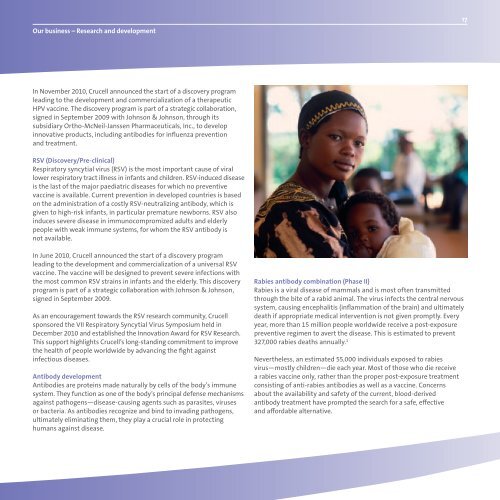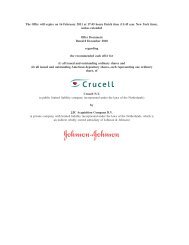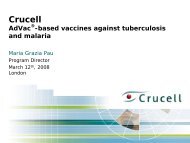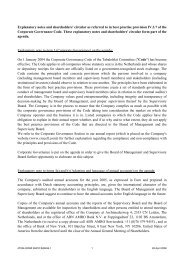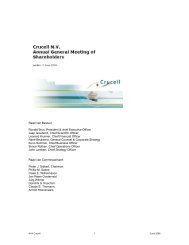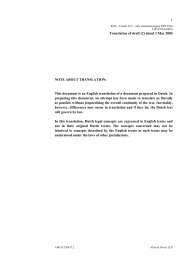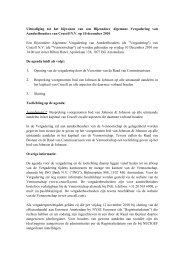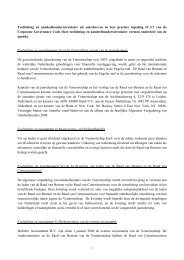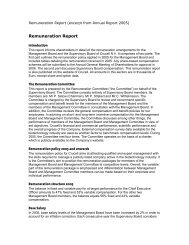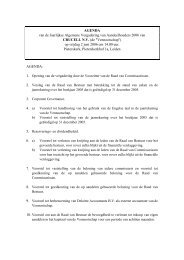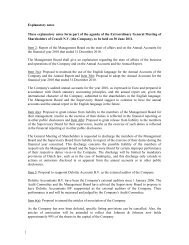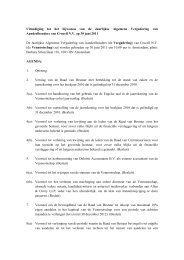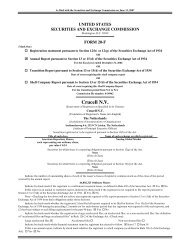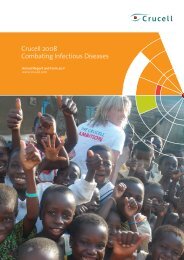Crucell corporate brochure (PDF)
Crucell corporate brochure (PDF)
Crucell corporate brochure (PDF)
You also want an ePaper? Increase the reach of your titles
YUMPU automatically turns print PDFs into web optimized ePapers that Google loves.
Our business – Research and development<br />
In November 2010, <strong>Crucell</strong> announced the start of a discovery program<br />
leading to the development and commercialization of a therapeutic<br />
HPV vaccine. The discovery program is part of a strategic collaboration,<br />
signed in September 2009 with Johnson & Johnson, through its<br />
subsidiary Ortho-McNeil-Janssen Pharmaceuticals, Inc., to develop<br />
innovative products, including antibodies for influenza prevention<br />
and treatment.<br />
RSV (Discovery/Pre-clinical)<br />
Respiratory syncytial virus (RSV) is the most important cause of viral<br />
lower respiratory tract illness in infants and children. RSV-induced disease<br />
is the last of the major paediatric diseases for which no preventive<br />
vaccine is available. Current prevention in developed countries is based<br />
on the administration of a costly RSV-neutralizing antibody, which is<br />
given to high-risk infants, in particular premature newborns. RSV also<br />
induces severe disease in immunocompromized adults and elderly<br />
people with weak immune systems, for whom the RSV antibody is<br />
not available.<br />
In June 2010, <strong>Crucell</strong> announced the start of a discovery program<br />
leading to the development and commercialization of a universal RSV<br />
vaccine. The vaccine will be designed to prevent severe infections with<br />
the most common RSV strains in infants and the elderly. This discovery<br />
program is part of a strategic collaboration with Johnson & Johnson,<br />
signed in September 2009.<br />
As an encouragement towards the RSV research community, <strong>Crucell</strong><br />
sponsored the VII Respiratory Syncytial Virus Symposium held in<br />
December 2010 and established the Innovation Award for RSV Research.<br />
This support highlights <strong>Crucell</strong>’s long-standing commitment to improve<br />
the health of people worldwide by advancing the fight against<br />
infectious diseases.<br />
Antibody development<br />
Antibodies are proteins made naturally by cells of the body’s immune<br />
system. They function as one of the body’s principal defense mechanisms<br />
against pathogens—disease-causing agents such as parasites, viruses<br />
or bacteria. As antibodies recognize and bind to invading pathogens,<br />
ultimately eliminating them, they play a crucial role in protecting<br />
humans against disease.<br />
Rabies antibody combination (Phase II)<br />
Rabies is a viral disease of mammals and is most often transmitted<br />
through the bite of a rabid animal. The virus infects the central nervous<br />
system, causing encephalitis (inflammation of the brain) and ultimately<br />
death if appropriate medical intervention is not given promptly. Every<br />
year, more than 15 million people worldwide receive a post-exposure<br />
preventive regimen to avert the disease. This is estimated to prevent<br />
327,000 rabies deaths annually. 1<br />
Nevertheless, an estimated 55,000 individuals exposed to rabies<br />
virus—mostly children—die each year. Most of those who die receive<br />
a rabies vaccine only, rather than the proper post-exposure treatment<br />
consisting of anti-rabies antibodies as well as a vaccine. Concerns<br />
about the availability and safety of the current, blood-derived<br />
antibody treatment have prompted the search for a safe, effective<br />
and affordable alternative.<br />
17


